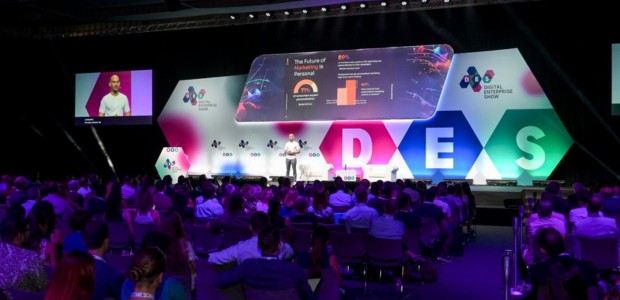
AI to improve industries: from neurodata for trauma recovery, to the democratisation of art and the success of marketing
The application of AI is achieving huge advances in the industry, from optimising productivity to achieving hyper-personalisation in customer service, boosting creativity and improving people's health. Digital Enterprise Show (DES), the largest European event dedicated to exponential technologies held last week in Malaga, Spain, has addressed how the application of AI is contributing as a lever for the transformation and competitiveness of companies.
In the healthcare sector, AI is achieving great benefits in improving people's wellbeing. However, with the irruption of neurodata, it is necessary to guarantee new individual rights, boost regulation, as well as the responsible use of technology. Ana Maiques, CEO of Neuroelectrics, addressed the possibilities offered by the application of AI to neuroscience. "Using neural twins to see what happens in brains suffering from depression, epilepsy, etc. we can also stimulate the brain with electroshocks to treat it.” But, at the same time, she has brought up privacy challenges. "Right now, you can choose not to have social media profiles if you don't want to see what's on them. But once you have things implanted in your brain, you don't have a choice. It's a big unknown what technology like implants will do to us."
Poonacha Machaiah, Chief Executive Officer at The Chopra Foundation, said that "the future of AI in health is to make disease 'optional'. We should not die of diseases, which are largely due to lifestyle factors rather than genetics". At the same time, he advocated a conscious use of data and considered that the correct application of AI can help to counteract episodes of suicide and other technologies, such as the metaverse, can aid recovery from trauma and phobias.
At the same time, Oualae Alami, Global Commercial Lead, Combos and Influenza Vaccines at Pfizer highlighted the improvements that AI is bringing to the early identification of cancer and the optimisation of treatments. She also considered that this technology can improve access to treatment and health information with equity, but to do so "we need a good representation of ethnicity and gender, and we need to make sure that AI corrects some of the biases, errors, that science has had in the past".
AI, revolutionary in Marketing
DES was joined by Neil Patel, ranked by Forbes as one of the top 10 marketers and co-founder of NP Digital, who discussed the improvements that AI is bringing to the industry. "Most people overestimate what AI can do now. It's not a magic wand, but they underestimate what it will do in the future," he said. He explained that AI is helping to save time and costs and boost campaign personalisation and performance. "AI can help build trust with audiences by understanding what they like and dislike," he said. As such, $240 billion has been wasted on ineffective ad campaigns, and "AI can uncover more ways to improve ad spend and ROI".
Another way to boost entertainment
DES launched for the first time the Entertainment Forum which explored the impact of AI on the industry. TV presenter Luján Arguelles argued in favor of the human touch in the industry. "A machine can't watch as we do," she said while advocating for regulation of technology and good journalism practice. "Now thousands of news items are automatically generated, but when you click on them there is nothing," she said. Carlos Núñez, President and CEO of PRISA Media, agreed, stating that technological tools can be used to increase value, but not to replace content. "The work of the journalist will not be replaced. You must look for the news and investigate, and machines can't do that".
For his part, Ángel Durández, president of Arcadia Motion Pictures, highlighted the role of AI in the film industry. "It has made the cost of production much cheaper, which has generated less need to go abroad for filming". Evelio Acevedo, Managing Director of the Museo Nacional Thyssen-Bornemisza, said that, about public museums, "the big players in tech want to take advantage of art and data, but we must not forget the public". After stressing that AI is not currently capable of imitating the creative and emotional process of the artist, he indicated that the museum has issued NFTs on an experimental basis because "they make it easier to reach other audiences and democratise the art collection. We must take these steps to bring art closer to certain people".
Hospitality industry: application for sustainability drive
AI is also bringing great benefits to the hospitality industry, especially when it comes to driving sustainability and improving sustainable development goals. Carmen Gómez - Acebo, Sustainability Director Spain and Portugal at Coca-Cola Europacific Partners, considered AI essential not only to define the objectives and commitments associated with ESG criteria but also to apply transparency in the communication of data. "Our management team is making decisions based on sustainability data and how we impact the world globally.” And so, they have managed to reduce around 93% of emissions.
Similarly, Ana Abade, Institutional Relations Director for Spain and Portugal at Booking.com, highlighted the importance of data in helping tourists travel sustainably. "If we show the carbon footprint, we can make tourists choose how to travel with less impact on the environment". Other speakers such as Guillermo Espinosa de los Monteros, ESG Consulting Manager at Experis Spain, and Juan José Freijo, Chief Sustainability Officer and VP Government Affairs at Brambles, also confirmed the benefits of data to gain efficiency and contribute in a very beneficial way to the supply chain. "Thirty percent of the transports on the road today are empty. The data helps us to sort the goods going in one direction or the other to avoid this situation and reduce emissions," said Freijo.

